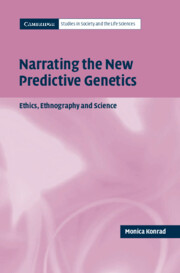7 - Concluding remarks
Published online by Cambridge University Press: 15 December 2009
Summary
Predictive medicine is a complex art
More often than not, predictive testing technology relies on the power of imagination. Interpreting and imparting to others the meaning of genetic information, or even withholding information, are acts that almost always involve the transfer of emotion between persons. Communicating probabilities and results through empathetic understanding, or living one's future in the face of new prognostic knowledge – in one way or another predictive medicine makes us ‘see’ ourselves in a different light. Unexpected health information may be interpreted in certain instances as helpful for a particular individual; on other occasions there may be unwelcome or even shocking news. Whatever the specific test outcome, enhancing predictability in human genomics produces the inescapable irony one may never know in advance quite how any given testee will respond. The art of predictive medicine is characterised by the richness of contingency and conjecture that is the human condition.
Of course there is the science of prediction too. Scientific knowledge inheres in the proven capacity of research geneticists, molecular biologists and bioinformaticians to identify links between specific genes, or clusters of genes, and particular diseases. But even these searches for correlation may be subject to uncertainty and imprecision. Within the clinical genetics community, it is a practically undisputed claim that the presence of multiple predisposing variants in several genes may make the ongoing search for links with disease challenging to study.
- Type
- Chapter
- Information
- Narrating the New Predictive GeneticsEthics, Ethnography and Science, pp. 146 - 159Publisher: Cambridge University PressPrint publication year: 2005



